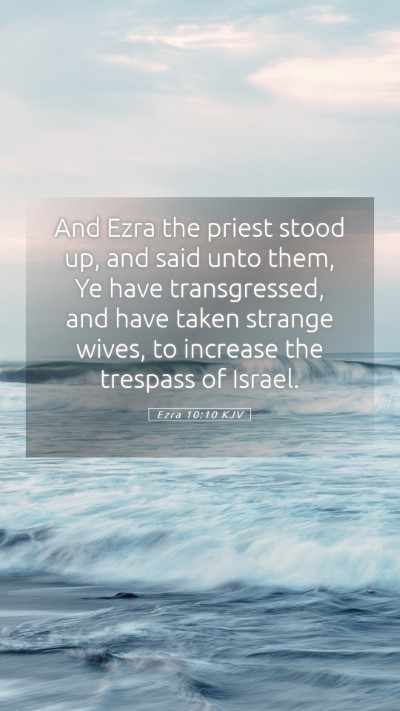Understanding Ezra 10:10 - A Comprehensive Commentary
In Ezra 10:10, we find a crucial moment in the post-exilic period of Israel, where Ezra confronts the people for their unfaithfulness in marrying foreign wives, which went against the Law of Moses. This verse serves as a significant turning point in the spiritual restoration of the Israelites.
Text of Ezra 10:10
"And Ezra the priest stood up and said unto them, Ye have transgressed, and have taken strange wives, to increase the trespass of Israel."
Contextual Background
Understanding the historical backdrop is essential to interpreting this passage:
- Exilic Context: The Jewish people had returned from Babylonian captivity, aiming to rebuild their community and restore adherence to God's laws.
- Spiritual Accountability: Ezra's role as a priest and scribe was pivotal, as he sought to ensure that the returning exiles remained faithful to their covenant with God.
Bible Verse Meanings and Interpretations
This passage has been analyzed within various esteemed commentaries:
Insights from Matthew Henry
Matthew Henry emphasizes the gravity of the transgression committed by the Israelites. He notes that marrying foreign wives represented a turning away from God’s commandments and a desire to assimilate into surrounding cultures.
Insights from Albert Barnes
Albert Barnes elaborates on the term "strange wives," interpreting it as a representation of disobedience to God’s directives. He details the preceding commandments that highlighted the importance of maintaining a distinct identity as God’s chosen people through lawful unions.
Insights from Adam Clarke
Adam Clarke discusses the implications of Ezra’s address. He explains that this moment underscores the necessity of repentance and the pursuit of spiritual purity. Clarke argues that Ezra’s public declaration was intended to catalyze a collective return to integrity and covenant fidelity.
Complexities and Theological Implications
Ezra 10:10 delves into various theological themes:
- The Importance of Community Accountability: Ezra’s call for action suggests that individuals within the community are responsible for one another’s spiritual health.
- God’s Covenant Faithfulness: The Israelites’ failures highlight the constant need for faithfulness in light of God’s covenant promises.
- Repentance and Restoration: Central to this chapter is the idea of turning away from sin and returning to God's path, a common theme throughout Scripture.
Application to Daily Life
For modern readers, Ezra 10:10 provides practical applications:
- Self-Examination: Believers are encouraged to examine their own lives and relationships to ensure they align with biblical teachings.
- Community Responsibility: The passage serves as a reminder that the church community should hold one another accountable in spiritual matters.
- Commitment to God’s Word: It reinforces the importance of immersing oneself in Scripture and living out its truths in everyday life.
Cross References
This verse connects to multiple other Scripture passages:
- Deuteronomy 7:3-4: Instructions against intermarriage with pagan nations.
- Nehemiah 13:23-27: Nehemiah’s reforms regarding foreign wives and their children.
- Malachi 2:11-12: God’s displeasure at unfaithfulness in marriage.
Conclusion
Ezra 10:10 stands as a powerful reminder of the need for holiness and fidelity to God's commands. It encourages believers to engage in Bible study insights and seek deeper Bible verse understanding to avoid spiritual pitfalls. As we examine its profound implications, it becomes a touchstone for repentance, community integrity, and a commitment to living faithfully in accordance with Scripture.


